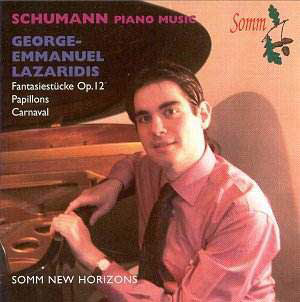The young Greek pianist George-Emmanuel Lazaridis is
one to watch. For this is an excellent Schumann recital, well judged
in matters of phrasing, tempi and articulation.
Schumann has a special character as a composer of piano
music, and he devoted the earlier part of his creative life wholly to
this genre of composition. Although he wrote splendid works, such as
the sonatas and the C major Fantasie, which adopt larger structures,
his significant achievement was in the newer field of shorter 'mood'
pieces held together across a longer time-span by a common theme. There
is a special challenge to the pianist in performing this music; namely
to project a unity within the context of the diversity of imageries
that Schumann necessarily offers.
If Papillons feels less of a whole than the other works
recorded here, that is surely because of the nature of the music, which
has rather less tension and subtle inter-relationships. In short, it
is not as successful a piece. It takes an artist of the greatness of
Claudio Arrau (Philips), for example, to really make this music sound
compelling.
No such doubts arise with Lazaridis's performance of
the Fantasiestücke or Carnaval. In the former he is at his best
when the rhythms are pointed: the opening number, Des Abends is very
fine, with some particularly well judged nuances of dynamic. The flowing
intensity of Aufschwung is more difficult to bring off, admittedly,
and Lazaridis chooses a sound basic tempo as his point of reference,
even if the voltage is lower than the ideal. These observations perhaps
reflect the experience of the whole eight movement work, though special
mention might be made of the fifth number, In Der Nacht, in which the
atmosphere is keenly felt.
Carnaval is the best known of these three pieces, of
course, and one of the pinnacles of the 19th century piano literature.
Lazaridis moves the music along from number to number with some telling
and subtle changes of focus, and deserves high praise. In fact he achieves
Schumann's intended aim, that the effect of the whole is rather more
than the sum of the parts. Occasionally as in the beautifully observed
character study, 'Chopin', the performance might have been more strongly
articulated, but this is a minor cavil, since this is very enjoyable
performance, by a fine pianist.
The recording is truthful and the acoustic atmospheric,
while the Somm production standards are high, including useful notes
and detailed cue points. It is also pleasing to find that a Fazioli
piano was used. The tone quality is second to none.
Terry Barfoot


